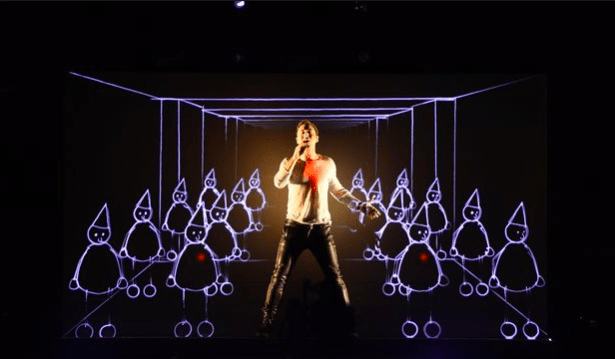“Over the past five years, Britain has produced some of the biggest chart-topping acts on the planet from Adele to One Direction, Ed Sheeran, Sam Smith. But in nearly two decades, it has failed to produce a single winner of Eurovision.” – BBC 1 News, 24 May 2015.
That’s one way of putting it. Another way is to say the BBC has failed to produce a Eurovision winner: its bureaucrats are the ones choosing the British entry, and they get it wrong every time. Graham Norton and Paddy O’Connell are superb, funny and knowledgable hosts; I have nothing but praise for how the BBC actually covers Eurovision. But it’s time the BBC subcontracted the job of actually picking the UK entry, because it’s horribly clear that, as an organisation, it just does not know how. It can’t be bothered to run contest or a televote conducted in so much of the continent. It’s all done by bureaucrats.
Electro Velvet, the duo that represented Britain this year, was invented by the BBC. For what it’s worth I thought Alex Larke and Bianca Nicholas were the best talent we’ve had in a while – but they never stood a chance. The BBC fretted about making sure their song, I’m Still In Love With You, looked swanky in a video featuring about 20 dancers. But that was never going to help on the night because only six people are allowed on a Eurovision stage.
So the singers looked lonely, and the act looked bald. They seemed to have minimal choreographic coaching. Larke fronts a Rolling Stones tribute band; if he can move like Jagger then why didn’t he dance? And then this peculiar this Charleston-esque tune: hitting Europe with a remake of 1994’s Doop was a massive gamble, and one that backfired badly. But I have no criticism of our performers, and they should console themselves with the fact that the great Monica Zetterlund got nul points in 1964. She was simply sent to Eurovision with the wrong song, as were they.
The absence of a contest to find the UK entry means its artists have no chance to learn how to perform the song in front of a crowd, or a live TV camera. (It means looking all modest and over-awed as the rather good Russian entry did last night; Polina Gagarina is a 28-year-old pro who has been doing this for ten tears – she knows, the act after the song helps you win. Look shy, while voters decide).
Because the BBC pays so much to Eurovision, the UK act is guaranteed a place at the final rather than having to qualify in one of the semis. So the first time Electro Velvet performed in front of a live audience was on the night, the grand final. Britain needs to stop this, and reject the offer of ‘pre-qualification.’ Our Eurovision acts need the practise of the semi-finals, and the challenge of actually having to qualify.
Sweden, which has a fraction of the BBC’s budget, has now invented a brilliant Eurovision winning machine. It runs an X-Factor style contest called, MelodyFestival, whose production values are now higher then Eurovision itself. By the time Måns Zelmerlöw got to the stage tonight he was like a thoroughbred groomed for this one particular race. Heroes, his song, won by introducing digitised choreography into the mix. This stunt can be pulled by experienced stage performers like Beyonce (in Girls at the Billboard Awards) but has never been tried in Eurovision. The creative race of MelodyFestival inspired Zelmerlöw to get this all just right. As I blogged at the time, the result was extraordinary.
Heroes was genuinely a nation’s entry – it was no1 in the Sweden charts. The UK entry didn’t make our charts. Rule no1 of Eurovision: if you can’t sell a song to the home audience, then foreigners probably won’t buy it either.
Britain does have talent — enough of it to win Eurovision every year if we did it properly chose. The contest may be laughed at by the BBC hierarchy, but is taken very seriously by most of the continent. They like and admire Britain, yet cannot work out why we don’t send any proper talent. Maybe next year, we will.







Comments